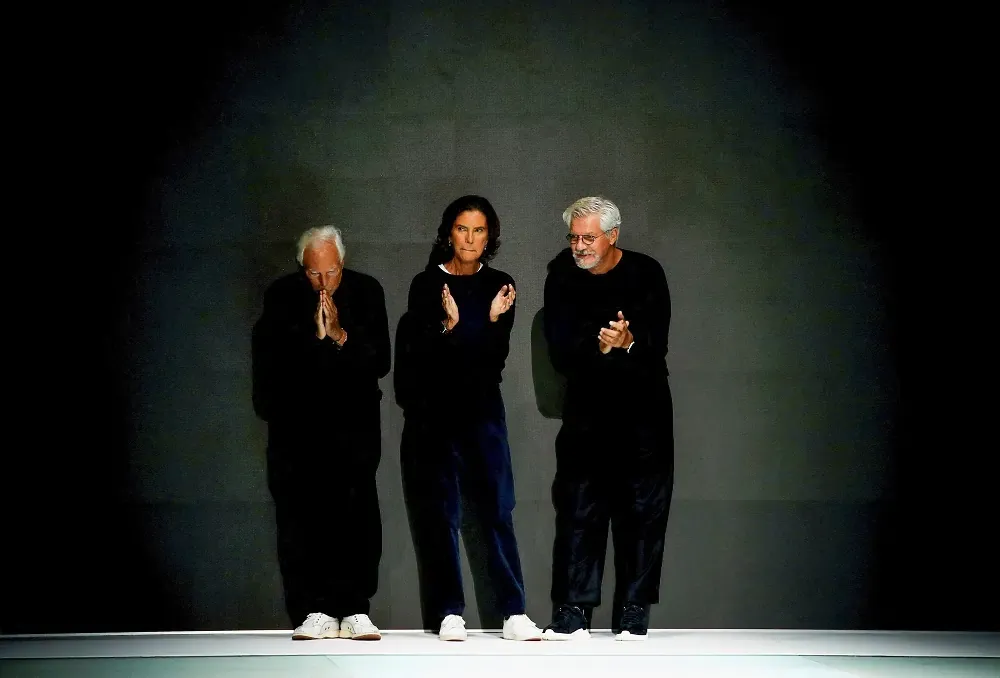
Giorgio Armani fashions his own legacy with succession plan
By Elisa Anzolin
MILAN (Reuters) – Giorgio Armani has always kept a tight grip on the firm he founded, and the Italian fashion king’s attention to detail extends to clear rules on how it should be run after his death.
Armani, 89, remains CEO and effectively sole shareholder of the business he set up with his late partner in the 1970s, which had a 2.35 billion euros ($2.5 billion) turnover last year.
With no children to pass it on to, there has been speculation about the long-term future of Armani’s empire and whether, in an industry dominated by luxury conglomerates, it will be able to maintain the independence he treasures.
But a hitherto obscure document from 2016, held by a notary in Milan and reviewed by Reuters, sets out the future governing principles for those who inherit the group, while another details issues including protecting jobs at the firm.
The first document explains how his heirs should approach a potential stock market listing – though not until five years after his passing – and any potential M&A activity.
For the Armani look itself, the document commits them to the “search for an essential, modern, elegant and unostentatious style with attention to detail and visibility”.
The document is the product of an extraordinary meeting that Armani called in 2016 to adopt new bylaws for the group which would come into force upon his death.
SUCCESSION PLAN
Armani’s heirs are expected to include his sister, three other family members working in the business, long-term collaborator Pantaleo Dell’Orco and a charitable foundation.
The bylaws divide the company’s share capital into six categories with different voting rights and powers, and were amended in September to create some without voting rights.
The Armani group, which as well as the CEO also represents the family members mentioned in the document, declined to comment on the document or its contents.
It is not clear from the document how the different blocs of shares will be distributed, but corporate governance experts say the guidelines should ensure a relatively smooth transition by giving the board a central role.
“It is an organization that reduces the margins for disagreement between the heirs,” Guido Corbetta, professor of Corporate Strategy at Milan’s Bocconi University, told Reuters.
Armani has a younger sister, Rosanna, two nieces, Silvana and Roberta, as well as a nephew, Andrea Camerana. Dell’Orco is also considered part of the family.
All are currently board members and, apart from Rosanna, all work for the Armani group.
Silvana and Dell’Orco are heads of design, working closely for decades with Armani, who dubbed them his “lieutenants of style”.
The 2016 bylaws set the process for how the board will appoint future women’s and men’s style directors in a company known for its classic tailoring.
Roberta is Head of Entertainment & VIP Relations, while Camerana is sustainability managing director.
Other fashion groups including LVMH, Europe’s most valuable luxury company, also have succession issues, with the five children of LVMH CEO and Chairman Bernard Arnault all having key management roles at brands in the empire.
LASTING LEGACY
Armani also created a foundation in 2016 which currently has a tiny symbolic stake but is earmarked to play a pivotal role in protecting the business he set up with Sergio Galeotti before going it alone when his partner died in 1985.
Its purpose is to reinvest capital for charitable causes and to maintain Armani’s lasting influence over the group.
The foundation’s bylaws, which were also seen by Reuters, call for it to manage the shareholding with the aim of creating value, maintaining employment levels and the pursuit of company values. The Armani group has almost 9,000 employees.
The arrangement has echoes of one adopted by Rolex founder Hans Wilsdorf who left the brand to a foundation in 1960 that still owns the luxury watchmaker.
Armani has always defended his firm’s independence and ruled out a merger, especially with the French groups that swallowed up Italian brands such as Gucci, now owned by Kering.
The group bylaws include a “cautious approach to acquisitions aimed solely at developing skills that do not exist internally from a market, product or channel point of view”.
They also provides for the distribution of 50% of net profits to shareholders.
Any eventual stock market listing requires the favourable vote of the majority of directors “after the fifth year following the entry into force of this statute”.
The Armani group declined to comment on a potential listing in the mid-term.
“The founding principles show Armani’s desire to transmit and prolong his idea of a company, of business, there is a desire for eternity,” Bocconi professor Corbetta said.
Despite his meticulous planning, whether Armani’s aims outlast him will ultimately be beyond his control.
“They (the rules) could restrict the company a little and become incompatible with drastic changes in the market,” Corbetta said.
($1 = 0.9376 euros)
(Reporting by Elisa Anzolin; Editing by Keith Weir and Alexander Smith)

